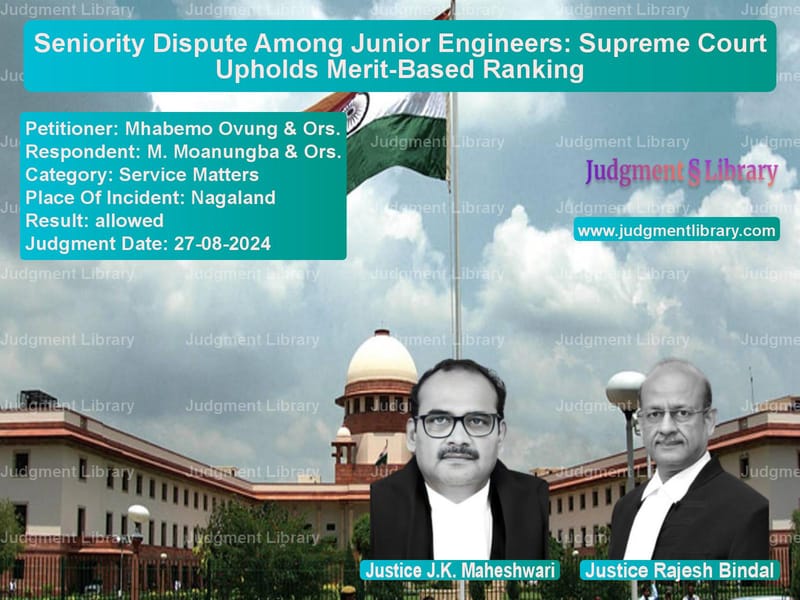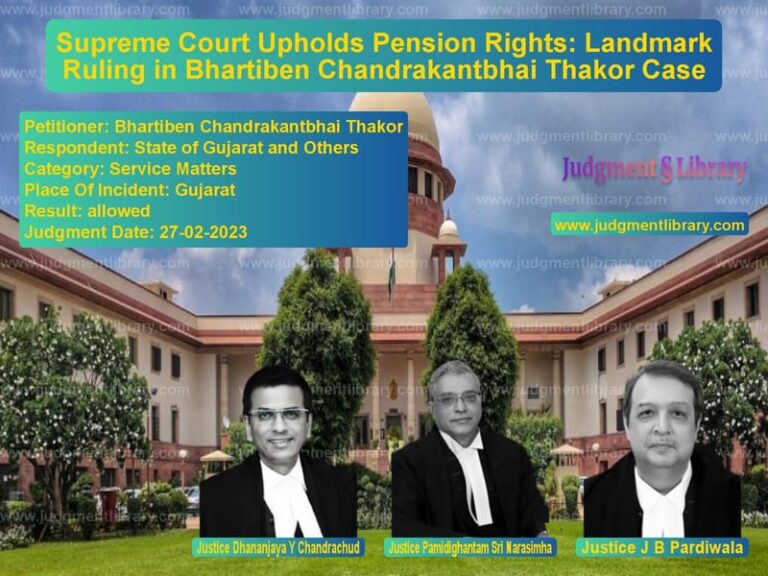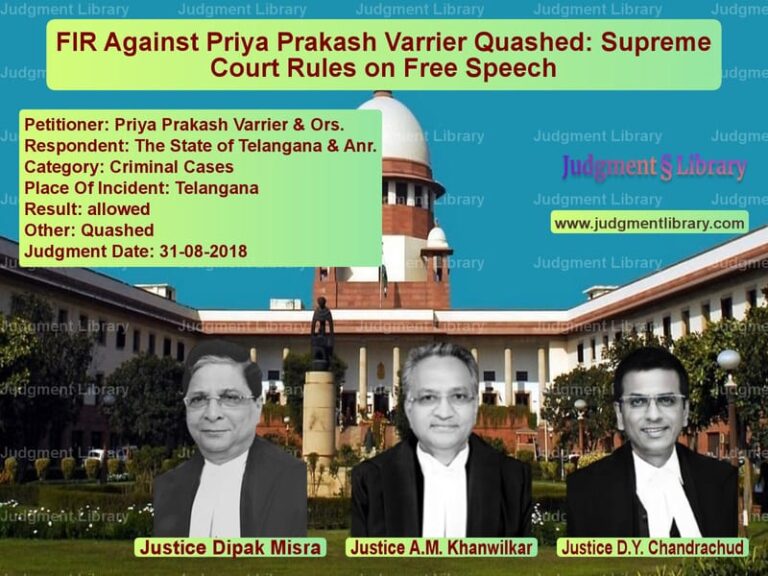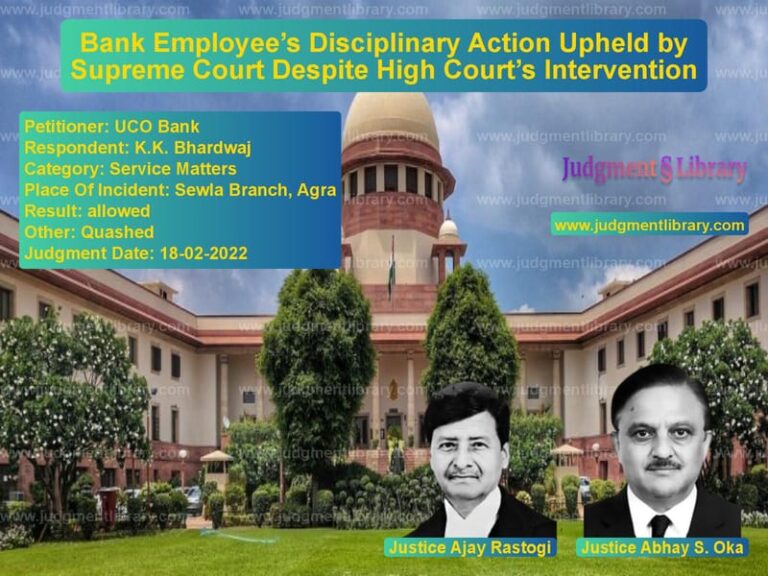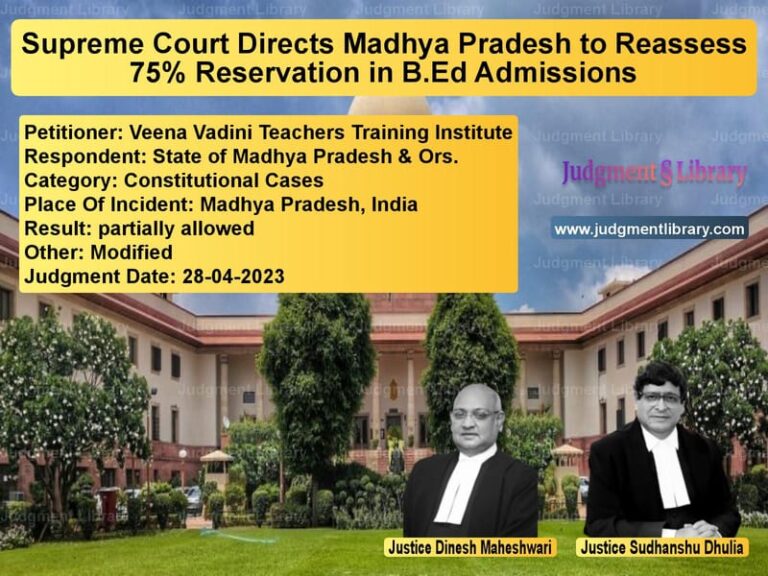Seniority Dispute Among Junior Engineers: Supreme Court Upholds Merit-Based Ranking
The Supreme Court of India recently delivered a crucial judgment in the case of Mhabemo Ovung & Ors. vs. M. Moanungba & Ors., addressing the long-standing dispute over the inter se seniority of Junior Engineers in the state of Nagaland. The case involved a legal battle between engineers recruited directly through the Nagaland Public Service Commission (NPSC) and those whose posts of Sectional Officer, Grade-I, were later upgraded to Junior Engineer. The judgment set an important precedent regarding the principle of merit-based seniority in government employment.
Background of the Case
The dispute began with the final seniority list of Junior Engineers, circulated on March 26, 2018. The list determined the ranking of engineers who had joined from two different sources:
- Direct recruits: Engineers who were appointed through the Nagaland Public Service Commission (NPSC) examination.
- Promoted engineers: Sectional Officers, Grade-I, who were upgraded to the rank of Junior Engineer through a government notification.
Aggrieved by the seniority list, a group of promoted engineers filed a writ petition challenging the ranking. The learned Single Judge of the High Court dismissed their petition. However, the Division Bench of the High Court reversed this decision and ordered a new seniority list, favoring the promoted engineers.
The direct recruits and the State of Nagaland appealed this ruling in the Supreme Court, seeking the restoration of the original seniority list.
Arguments of the Petitioners (Direct Recruits)
Represented by senior counsel, the petitioners argued that:
- They were selected through a rigorous examination process conducted by the Nagaland Public Service Commission in strict adherence to the Nagaland Engineering Service Rules, 1997.
- They were appointed as Junior Engineers on May 1, 2003 in the pay scale of ₹6000-9750.
- The promoted engineers had originally held the rank of Sectional Officer, Grade-I, with a lower pay scale of ₹4500-7000, and their posts were only upgraded to Junior Engineer status on October 11, 2007.
- Since the promoted engineers were only designated as Junior Engineers in 2007, they could not claim seniority over those directly recruited in 2003.
- Several earlier seniority lists were issued but never finalized. The first finalized list was issued in 2018, correctly placing direct recruits above the promoted engineers.
- The High Court’s Division Bench decision had erroneously granted retrospective seniority to promoted engineers from a period when they were not even part of the Junior Engineer cadre.
Arguments of the Respondents (Promoted Engineers)
The promoted engineers, who had originally served as Sectional Officers, Grade-I, argued that:
- Their officiating promotion was regularized through an Office Order dated March 31, 2007, which granted them deemed seniority from an earlier period.
- Since their posts were upgraded to Junior Engineer status, they should be placed at the same level as direct recruits.
- The seniority principle should consider their total years of service, including their time as Sectional Officers.
- The High Court correctly directed the recalibration of the seniority list in their favor.
Supreme Court’s Key Observations
The Supreme Court meticulously examined the case and delivered its judgment on August 28, 2024. The key observations were:
- The Division Bench of the High Court had erred in granting retrospective seniority to promoted engineers from a date when they were not even Junior Engineers.
- The recruitment rules of 1997 clearly distinguished between direct recruits and those promoted from lower grades.
- The original 2018 seniority list, which placed direct recruits above promoted engineers, was in line with established legal precedents.
- The upgradation of Sectional Officer, Grade-I, to Junior Engineer did not automatically grant those officers the same seniority as directly recruited engineers.
- Seniority cannot be assigned from a date before an employee enters a particular cadre.
Final Judgment
The Supreme Court set aside the High Court’s order and upheld the seniority list issued on March 26, 2018. The Court ruled:
- The direct recruits who joined as Junior Engineers in 2003 will maintain their seniority.
- The promoted engineers, whose posts were upgraded in 2007, cannot claim seniority over direct recruits.
- The principle of merit-based seniority must be upheld in government service.
Legal Precedents Cited
The Supreme Court relied on various judgments to support its decision, including:
- State of Uttaranchal vs. Dinesh Kumar Sharma (2007): Holding that seniority cannot be granted retrospectively.
- P. Sudhakar Rao vs. U. Govinda Rao (2013): Affirming that upgradation of a post does not change seniority rules.
- Ganga Vishan Gujrati vs. State of Rajasthan (2019): Establishing that direct recruits should not be deprived of seniority due to administrative reclassification of other employees.
Implications of the Judgment
This ruling has far-reaching consequences for government employment and seniority disputes:
- Merit-based seniority upheld: The judgment reinforces the principle that seniority must be based on the date of entry into a cadre, not on administrative upgradation.
- Protection of direct recruits: This ruling ensures that those who enter government service through competitive examinations are not unfairly superseded.
- Prevention of retrospective seniority claims: The judgment prevents employees from claiming seniority benefits from a time when they were not part of a cadre.
Conclusion
The Supreme Court’s verdict in this case reaffirms the legal principles governing seniority disputes in government employment. By setting aside the High Court’s decision and upholding the original 2018 seniority list, the Court has reinforced the fundamental principle that seniority should be determined based on merit and the actual date of entry into a cadre, rather than subsequent administrative upgradations. This ruling serves as a guiding precedent for future disputes in public service employment.
Petitioner Name: Mhabemo Ovung & Ors..Respondent Name: M. Moanungba & Ors..Judgment By: Justice J.K. Maheshwari, Justice Rajesh Bindal.Place Of Incident: Nagaland.Judgment Date: 27-08-2024.
Don’t miss out on the full details! Download the complete judgment in PDF format below and gain valuable insights instantly!
Download Judgment: mhabemo-ovung-&-ors.-vs-m.-moanungba-&-ors.-supreme-court-of-india-judgment-dated-27-08-2024.pdf
Directly Download Judgment: Directly download this Judgment
See all petitions in Promotion Cases
See all petitions in Recruitment Policies
See all petitions in Public Sector Employees
See all petitions in Employment Disputes
See all petitions in Judgment by J.K. Maheshwari
See all petitions in Judgment by Rajesh Bindal
See all petitions in allowed
See all petitions in supreme court of India judgments August 2024
See all petitions in 2024 judgments
See all posts in Service Matters Category
See all allowed petitions in Service Matters Category
See all Dismissed petitions in Service Matters Category
See all partially allowed petitions in Service Matters Category

